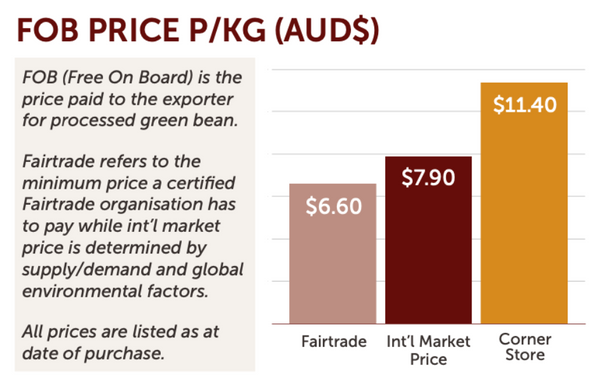In a world where the line between genuine ethical practices and surface-level gestures is increasingly blurry, identifying businesses that truly align with your values can be an overwhelming task. The term ‘greenwashing’ has become all too familiar, referring to businesses that make deceptive claims which make them sound much more purpose-driven than they actually are.
And while certifications seem like a reliable stamp of approval, a closer look reveals that they don't always guarantee what’s best for people and planet. When you consider that at the time of our last Timor coffee purchase, the International Fairtrade coffee minimum rate was 16% less than the International Market Price, you’ll start to notice the system is flawed. Of course, that’s not to say that all certifications are bad - but that’s a discussion for another day!
In this era of global boiling and excessive consumerism, the need to distinguish ethical businesses from the crowd has never been more critical. So here are six things to look for to vet any business you’re thinking of ‘responsibly’ buying off.
1. Transparency: The Open Book Approach
Transparent and straightforward statements are arguably the best way to pick an ethical business from the bunch. This means transparency about operations, supply chains and impacts - all readily available, and all clear and concise. But to confuse matters, transparency doesn’t always equate to trustworthy. Being open but vague or bombarding with technical statements that aim to confuse are both huge red flags!
Here are some examples of vague statements that, without any additional context or details, are potential examples of greenwashing. Of course, if these statements are accompanied by details - and answer some of the questions listed below - it is fair to say that the organisation is doing its best to be transparent.

Taken from Woodside Energy
On the flip side, here are some examples of transparent and straightforward explanations that back up the point the business is trying to make, in an easy to understand way.

Taken from Allbirds

In summary, when a business openly shares details about its supply chain, sourcing practices and internal processes, you can be more confident that it has nothing to hide.
2. Open Communication Channels: Human Interaction Matters
There is perhaps nothing more frustrating than wanting to speak to a human but only being able to speak to a machine! Ethical businesses are more likely to provide two-way communications channels because they (should) have nothing to hide. Open communication channels encourage questions, feedback and concerns, showing at the very least that a business respects the voice of its community. Knowing that there's a human on the other end of the line ready to address your queries also creates a sense of accountability; it signifies a willingness to engage in meaningful dialogue and a genuine commitment to improvement.
That’s not to say that all businesses that list a phone number are ethical, but it’s certainly a red flag if they don’t!
3. Concern for People: Embracing Social Responsibility
An ethical business doesn’t solely focus on profits; in fact, it puts people first. This includes everyone from employees and suppliers to partners and the community at large. Look for businesses that don’t just make a stand against unethical practices, but who actively demonstrate actions aimed at improving the lives of those involved in their operations.
The bare minimum in social responsibility should be fair wages and safe working conditions, but those who go above and beyond might facilitate economic empowerment within communities or engage in partnerships that foster positive change. For example, rather than just buying coffee beans from our farming partners, we work with them to diversify their crops. By opening up new markets for vanilla, turmeric and peppercorns, we help them increase revenue and improve their livelihoods.
Here’s an example of what going above and beyond might look like.

Taken from Tony’s Chocolonely
4. Concern for the Environment: A Commitment to Regeneration
Ethical organisations put the planet before profit. They take steps to reduce their footprint, combat climate change and restore ecosystems. However, sustainability is no longer enough; organisations need to focus on regeneration if we are to stand any chance against global boiling. Here’s why.
Look for businesses that embrace environmentally friendly practices, whether it’s offering a closed loop product, eliminating packaging, running entirely off on-site solar panels, replacing synthetic for natural fibres or like us, providing coffee that plants trees. As always, ensure there are details to back any environmental claims up!
Here’s an example of tangible actions that have positive environmental implications:

Taken from Chia Sisters
5. Strong Leadership: Guided by Ethical Values
Ethical businesses are often steered by leaders who exemplify ethical values. Take a closer look at the individuals in management or on the board of directors. Leaders who prioritise integrity, honesty and ethical decision-making tend to foster a culture of responsibility throughout the organisation.
Diversity in both management and teams is also likely to mean that the business is operating in a way that’s beneficial to everyone, not just the most privileged. Look for organisations that comprise a range of people from different backgrounds and with different life experiences.
You might remember this comparison between Trump’s 2017 cabinet to Obama’s in 2009… Well, you get the point!

6. Internal Programs: Supporting the Community
A final cornerstone of an ethical business is that they actively contribute to the betterment of society. Seek out businesses that go out of their way to give back or participate in programs that support charities or disadvantaged groups. This kind of active involvement demonstrates a commitment to giving back and creating a positive impact beyond an organisation’s immediate sphere.
It could mean giving staff set days to participate in corporate volunteering, donating products to those in need, sponsoring local teams or matching donations to worthy causes.
Here’s an example of a recent Corner Store initiative to provide meals for local households facing food insecurity.

Taken from Corner Store Network
A Final Word: Your Power for Positive Change
Each of us carries a powerful tool: our purchasing decisions. The choices we make influence the trajectory of businesses and shape the landscape of ethical commerce. By seeking out and supporting businesses that align with your values, you cast a vote for the kind of future we want to see.
Of course, with governments and industry slow to implement change, even more responsibility falls on businesses. Even those striving to be the most ethical operator will always have room to improve. Ethical practices also aren't static; they evolve with the ever-changing dynamics of our world. As businesses, we need to continually assess and re-evaluate our practices, ensuring they uphold the highest standards. Corner Store Network is absolutely no exception! Which is why we welcome feedback, suggestions or comments - see point 2 😉.
In the journey towards a more responsible and sustainable future, we are all stakeholders, each with a vital role to play.


